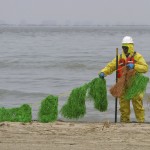NTSB: Coast Guard Could Have Done More to Prevent Galveston Oil Spill
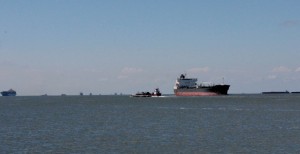
Dave Fehling,StateImpact
Big freighters and small barges in the Houston Ship Channel near the site of the collision
U. S. Coast guard investigators are reviewing testimony they heard during a four-day hearing held last week in Galveston. They’re trying to learn what might have prevented the collision of a freighter with a barge carrying fuel oil in March. Some of what they heard points a finger right back at the Coast Guard.
Along Galveston Bay, the big collision is still fresh in the minds of people who have a front row seat to the very busy Houston Ship Channel. John McMichael is a retired Navy submarine officer who manages Seawolf park on Pelican Island.
“They knew they were there. They were on the radar. It’s hard to fathom that it would have happened in today’s world,” McMichael told StateImpact Texas.
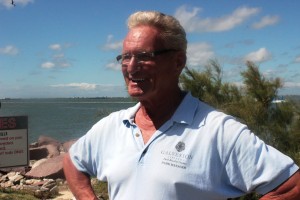
Dave Fehling / StateImpact
John McMichael, a retired Navy submarine officer who manages a park on Pelican Island
But a collision did happen on a foggy Saturday this past March. A fuel barge collided with the much larger freighter, and the collision and resulting spill of 170,000 gallons of fuel oil coated portions of shoreline from Galveston to Matagorda.
The pilot of the big freighter and the skipper of the smaller barge were talking by radio about the collision they both knew was about to happen.
“Well if you keep on going I’m gonna getcha you … because right now I’m less than three quarters of a mile from you,” radioed the Summer Wind freighter to the barge, Miss Susan which responded, “Alright, glad I called you here. “
The audio, first obtained by the Houston Chronicle, was from the minutes leading up to the collision. Given the size and unstoppable momentum of the two vessels, the accident unfolded like a disaster in slow motion.
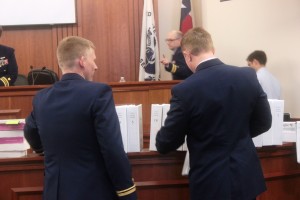
Dave Fehling / StateImpact
US Coast Guard investigators held a hearing in Galveston to learn what might prevent future accidents
“[Miss Susan] I’m looking at you now. It don’t look good. [Summer Wind] Yeah, it don’t look good … ”
Not good at all, because it was too late to change course, and the freighter struck the barge broadside.
In hearings led by the U.S. Coast Guard last week in Galveston, the pilots and skippers at the helm of the vessels gave investigators insight into what led to the collision.
There was testimony that the barge skipper’s radio warnings of its position might not have been heard initially by the freighter. And that the freighter might have unexpectedly increased its speed, throwing off the barge’s calculations of how much time it had to clear the channel.
But there was a bigger issue brought up, not by the Coast Guard, but by the National Transportation Safety Board (NTSB).
“I think the Safety Board has a vested interest in this,” said Rob Jones, a Senior Marine Investigator with the NTSB who was on the investigative panel holding the hearing.
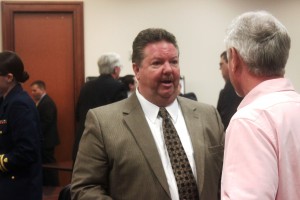
Dave Fehling / StateImpact
Rob Jones is a senior marine investigator with the NTSB
Jones cited past accidents in other ports in which the NTSB had recommended that the Coast Guard be more aggressive in monitoring ship traffic and communicating with vessels to try to head off collisions before they happened. But Jones said in this case, the testimony he heard indicated the Coast Guard had not done that.
“Everything I’m hearing from you is you’re given this authority, but you have no way to identify risk of collision. So why’s it written?“ Jones said as he questioned Coast Guard officers.
Identifying the risk of collision would be the responsibility of Coast Guard personnel in what’s called the Vessel Traffic Service (VTS). It’s the maritime equivalent of an air traffic control tower. From a room located at Ellington field, the Coast Guard monitors eight screens showing images from radar and video from 26 cameras up and down the Houston Ship Channel.
But the Coast Guard’s Lt. Commander Teresa Hatfield, who led the hearing, told StateImpact Texas it’s not up to the Coast Guard to give orders to ship pilots.
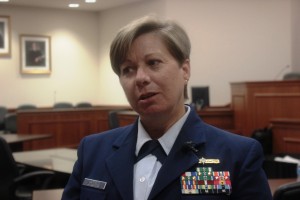
Dave Fehling / StateImpact
Lt. Com. Teresa Hatfield is chief of the investigations division of the US Coast Guard
“It is a very interesting and delicate balance, I would say, between those two things. We are not … are not pilots, are not ships captains, and they are not the ones out there on the water body that see everything that’s going on,” said Hatfield.
In testimony, the Coast Guard’s director of the Houston-Galveston VTS control center, Capt. Steven Nerheim, defended his personnel has having done all they could and said that despite tens of thousands of vessels using the Ship Channel every year, collisions he said are “vanishingly rare.”
